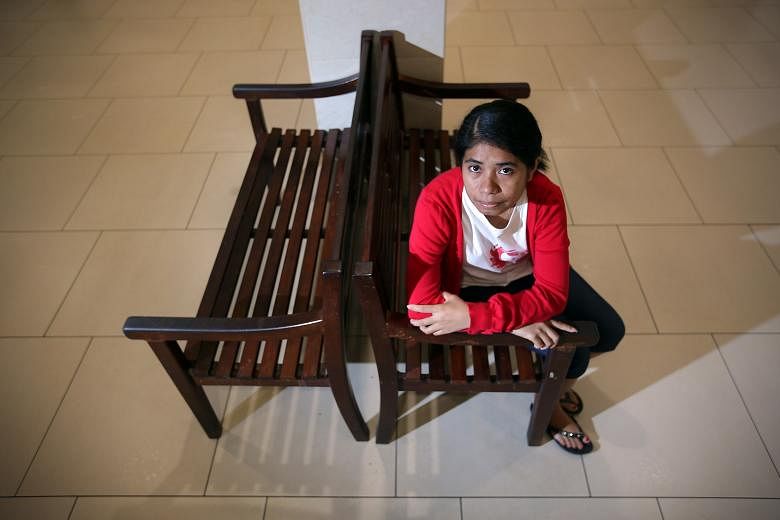For more than a year, Ms Mersi Fransina Missa fed, bathed and took care of her employer, who had suffered a stroke in August 2014.
But a second stroke in October last year left her employer - a retiree in her 60s - warded at Singapore General Hospital (SGH) in a vegetative state.
"She opens her eyes sometimes but she cannot move her hands or legs," said Ms Mersi, 28, who is single and from Kupang, Indonesia.
She continued her routine of shuttling between the hospital and her employer's one-room Housing Board flat in Havelock Road for a month. Then it got too expensive for the domestic worker, who has not been paid since October.
Ms Mersi, who is supposed to get $520 a month, said: "I had no more food to eat. I also got no money."
A doctor at SGH put her in touch with the Humanitarian Organisation for Migrant Economics (Home), and she has been living there since December.
Her case is one of about 600 complaints from maids about non-payment of salaries received by the Ministry of Manpower (MOM) each year for the past two years. Most involved the safekeeping of the money.
Her employer, who is single and has no children, used to keep $100 for her and pay her the rest.
"She usually paid me on time... But she cannot pay me any more now," said Ms Mersi, the eldest child of farmers. She used to remit $340 to her parents and six siblings, aged between two and 27, every month.
"My family at home is waiting for my money," she said.
This is the first case that Home has dealt with in which an employer cannot pay her maid because she is in a coma.
Calling it unusual, Home's casework director, Ms Valli Pillai, said it "underlies the risk of safekeeping domestic workers' wages. It's a practice which (Home is) against".
"The Employment Act forbids (safekeeping), so this should be extended to domestic workers too," she added.
Ms Mersi has tried approaching her employer's sister. "She visited my ma'am only once at home," said Ms Mersi. The second time they met was at the hospital. "She asked me whether I am getting paid, and I told her no. But I haven't heard from her any more," Ms Mersi said.
She said her employer has another relative, an aunt who visited her only twice, as far as Ms Mersi knows, but has never spoken to the maid.
"I feel helpless," she said. "Now I am just waiting for my money. I don't even know when I will go back to see my family."
Ms Mersi, who had worked for two other families since 2011, said she had enjoyed working for her employer. "She scolded me when I did something wrong, but she also smiled at me and we could talk (in English)," she said.
She did not mind the daily tasks involved in looking after her employer, a wheelchair-user who then weighed twice as much as Ms Mersi did and was only slightly taller than her petite 1.5m frame.
"I hope my ma'am is okay, but I also miss my family. I wish I can have my money back too," she said.
Her agent, Ms Sharon Ng at Yanda Employment Agency in Chinatown, said she is helping in MOM's investigations. "We are also in touch with the charity who referred (Ms Mersi) to us to see how we can help get her pay."
Investigations are ongoing, said MOM. Ms Mersi has been "informed that she can seek help from MOM should she require further assistance pending case resolution", a spokesman added.


